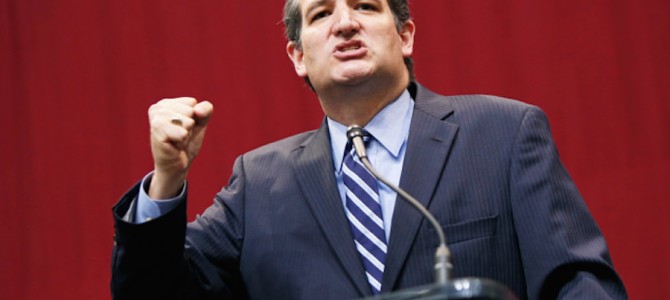
Today Ted Cruz makes his last stand in the state of Indiana. The odds are not in his favor – despite the support of a number of key party officials and the backing of a number of conservative groups, Cruz is up against the momentum and energy of a Trump campaign that has coalesced its support around a figure they view as their champion. Cruz’s closing case against Trump is that “We are not a bigoted, angry people.” But whether the former is accurate or not, the latter certainly isn’t – see Cruz’s own experience here of attempting to debate a screaming Trump supporter in Indiana. He’s not actually an Indiana voter – he’s an electrical worker from Ohio, as it turns out – and his top priority is second amendment rights, which he believes Trump will defend where Cruz will not.
Cruz turned out to have a greater appeal to the Republican electorate than Washington could ever anticipate, and his 2016 campaign was the most effective, maximizing his efforts in key states. Cruz’s theory of the race was that what it took to win was to be the insurgent conservative champion, adding to his Tea Party base of ideological voters with a portion of libertarians and a more significant portion of evangelicals. His campaign largely achieved this.
What he did not anticipate – what no one did – was that the importation of a deluge of white working class voters who were formerly part of the Democratic coalition would upend the race. Cruz stressed his appeal as a constitutional conservative, which was where much of the Republican base was in prior years – just not any more. The ideological battle he waged won over a significant portion of the party – but it was up against a group of people who cared less for ideology than they do for the appeal of identity politics.
As I wrote last August, not anticipating the Indiana reference:
‘Identity politics for white people’ is not the same thing as ‘racism’, nor are the people who advocate for it necessarily racist, though of course the categories overlap. In fact, white identity politics was at one point the underlying trend for the majoritarian American cultural mainstream. But since the late 1960s, it has been transitioning in fits and starts into something more insular and distinct. Now, half a century later, the Trump moment very much illuminates its function as one interest group among many, as opposed to the background context for everything the nation does. The white American with the high-school education who works at the duck-feed factory in northern Indiana has as much right to advance his interest as anyone else. But that interest is now being redefined in very narrow terms, in opposition to the interests of other ethnic groups, and in a marked departure from the expansive view of the freedoms of a common humanity advanced by the Founders and Abraham Lincoln.
The Cruz we see on the campaign trail today is hardened by this experience, and it remains to be seen how he will adapt to a post-presidential run reality. For much of this cycle, the press focused on Cruz’s dislikability – that he has so few of his colleagues in Washington who even like him – climaxing in John Boehner’s “Lucifer” comments this past week. Ana Marie Cox had a piece recently about why she can’t hate Cruz, because they have too much in common as awkward nerds who had to adapt. But analysts overestimate how much this factor is motivated by personal dislike among his colleagues so much as it is dislike for vindicating Cruz’s approach to success, which is what would happen if Ted Cruz would become the nominee. Vindicating that model of success has much more far-reaching consequences. It would send a message to freshman politicians that the best way for them to succeed isn’t going along and getting along with the established order of the way Washington works, but instead in taking a flamethrower to the whole thing.
Like all the others, Cruz’s standing has crumbled under the sustained assault of Donald Trump. Before the field began to shrink, Cruz had a net +48 favorability among Republicans and leaners – after it shrank and Trump focused his “Lyin Ted” attacks, Cruz’s negatives grew, to the point where he is now underwater for the first time. Trump achieved what Washington never could: he made Republican voters dislike Ted Cruz, and he did so by doing things like parrot the National Enquirer in suggesting that Cruz’s father was a pal of Lee Harvey Oswald and may have had something to do with the assassination of John F. Kennedy. “His father was with Lee Harvey Oswald prior to Oswald’s being — you know, shot. I mean, the whole thing is ridiculous,” Trump said Tuesday during a phone interview with Fox News. “What is this, right prior to his being shot, and nobody even brings it up. They don’t even talk about that. That was reported, and nobody talks about it… I mean, what was he doing — what was he doing with Lee Harvey Oswald shortly before the death? Before the shooting?” Trump continued. “It’s horrible.” See, Washington cartel, that’s how it’s done.
To a degree, Cruz has already succeeded in this by virtue of being the last man standing. If he loses today in Indiana, he may stay in the race simply to amass enough delegates to be a factor in other aspects of the convention besides the nomination. Had more portions of the party coalesced around Cruz earlier on, he could potentially have made a better stand. But the Republican Party wants what it wants, and it wants Donald Trump.









